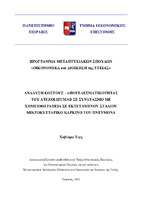Ανάλυση κόστους - αποτελεσματικότητας του Atezolizumab σε συνδυασμό με χημειοθεραπεία σε εκτεταμένου σταδίου μικροκυτταρικό καρκίνο του πνεύμονα
Cost effectiveness analysis of Atezolizumab plus chemotherapy in extensive - stage small - cell lung cancer

Προβολή/
Λέξεις κλειδιά
Μικροκυτταρικός καρκίνος πνεύμονα ; Οικονομική αξιολόγηση ; Κόστος ; Αποτελεσματικότητα ; ICER ; Atezolizumab ; TecentriqΠερίληψη
Ο καρκίνος του πνεύμονα αποτελεί την πρώτη αιτία θανάτου από καρκίνο παγκοσμίως.
Το 80% περίπου των περιπτώσεων αφορά στον μη μικροκυτταρικό καρκίνο του πνεύμονα (ΜΜΚΠ) και των 20% στον μικροκυτταρικό καρκίνο του πνεύμονα (ΜΚΠ) που είναι και ο ταχύτερα αναπτυσσόμενος καρκίνος. Χωρίζεται σε σχέση με την έκταση των βλαβών σε περιορισμένη νόσο και εκτεταμένη νόσο, όμως κατά τη διάγνωση το 30% περίπου με μικροκυτταρικό καρκίνο έχουν περιορισμένη νόσο. Στην περιορισμένη νόσο έχουμε 50-60% πλήρη ανταπόκριση με μέση επιβίωση με χημειοθεραπεία 15-24 μήνες. Στην εκτεταμένη νόσο η πλήρης ανταπόκριση είναι <20% με μέση επιβίωση 6-12 μήνες με χημειοθεραπεία, αλλά η μακρά επιβίωση είναι σπάνια.
Σύμφωνα με την κλινική μελέτη IMpower133, τα εκτιμώμενα ποσοστά συνολικής επιβίωσης ήταν σημαντικά μεγαλύτερα στην ομάδα του atezolizumab (διάμεσος 12,3 μήνες, 95% διάστημα εμπιστοσύνης [CI], 10,8 έως 15,9) από ό,τι στην ομάδα του εικονικού φαρμάκου (διάμεσος 10,3 μήνες, 95% CI, 9.3 έως 11.3).
Η επιβίωση χωρίς εξέλιξη της νόσου ήταν μεγαλύτερη στην ομάδα του atezolizumab (διάμεσος 5,2 μήνες, 95% CI, 4,4 έως 5,6) από ό, τι στην ομάδα του εικονικού φαρμάκου (διάμεσος 4,3 μήνες 95% CI, 4,2 έως 4,5). Η ατεζολιζουμάμπη είναι ένα Fc-βιοτεχνολογικά παρασκευασμένο, εξανθρωποποιημένο μονοκλωνικό αντίσωμα G1 (IgG1) που δεσμεύεται απευθείας στο PD-L1 και παρέχει διπλό αποκλεισμό των υποδοχέων PD-1 και B7.1, αποτρέποντας την PD-L1/PD-1 διαμεσολαβούμενη αναστολή της ανοσολογικής απάντησης, συμπεριλαμβανομένης της επανενεργοποίησης της αντικαρκινικής ανοσολογικής απάντησης χωρίς να επάγει την εξαρτώμενη από το αντίσωμα κυτταρική κυτταροτοξικότητα. Η ατεζολιζουμάμπη (Tecentriq) διαφυλάσσει την PD-L2/PD-1 αλληλεπίδραση επιτρέποντας στα PD-L2/PD-1 διαμεσολαβούμενα ανασταλτικά σήματα να διακινούνται. Στις 21 Σεπτεμβρίου 2017 χορηγήθηκε Άδεια Κυκλοφορίας από τον Ευρωπαϊκό Οργανισμό Φαρμάκων (ΕΜΑ) για το Tecentriq και στις 26 Ιουλίου 2019 εγκρίθηκε από τον ΕΜΑ η επέκταση της Άδειας Κυκλοφορίας για τη θεραπεία πρώτης γραμμής ενηλίκων ασθενών με εκτεταμένου σταδίου μικροκυτταρικό καρκίνο του πνεύμονα.
Σκοπός. Η ανάλυση αυτή σκοπό έχει την εκτίμηση του κόστους και της αποτελεσματικότητας του Atezolizumab (Tecentrriq) σε συνδυασμό με καρβοπλατίνη και ετοποσίδη, στη θεραπεία πρώτης γραμμής ενηλίκων ασθενών με εκτεταμένου σταδίου μικροκυτταρικό καρκίνο του πνεύμονα (EΣ- ΜΚΠ).
Μέθοδος. Ως μοντέλο ανάλυσης δημιουργήθηκε μοντέλο Markov με τρείς καταστάσεις υγείας: “χωρίς πρόοδο νόσου (PFS)”, “με πρόοδο νόσου (PD)” και “θάνατος”. Επιπλέον, βάσει των δεδομένων επιβίωσης των ασθενών της κλινικής μελέτης Impower 133, εκτιμήθηκε το προσδόκιμο ζωής του πληθυσμού ανάλυσης, το οποίο βρέθηκε να είναι 120 μήνες. Τέλος το μοντέλο ακολούθησε την πορεία των ασθενών υιοθετώντας κύκλους διάρκειας μίας εβδομάδας. Ακόμα, ως ετήσιο ποσοστό προεξόφλησης ορίστηκε το 3,5% όπως συστήνεται από τον NICE (UK) καθώς για την Ελλάδα δεν υπάρχουν σχετικές κατευθυντήριες οδηγίες.
Αποτελέσματα. Ο συνδυασμός atezolizumab/carboplatin/etoposide σε σύγκριση με placebo/ carboplatin/etoposide για τη θεραπεία πρώτης γραμμής ενηλίκων ασθενών με εκτεταμένου σταδίου μικροκυτταρικό καρκίνο του πνεύμονα παρουσίασε μεγαλύτερο κόστος ανά ασθενή αλλά ταυτόχρονα βελτίωσε το προσδόκιμο επιβίωσης (LYs) και τα ποιοτικά σταθμισμένα έτη ζωής (QALYs). Ο δείκτης ICER εκτιμήθηκε στα 118.108,68€/κερδισμένο QALY και στα 61.527,03€/ κερδισμένο LYG.
Η ανάλυση ευαισθησίας έδειξε ότι τα αποτελέσματα είναι ευαίσθητα στην τιμή του φαρμάκου αλλά όχι ευαίσθητα στο ποσοστό προεξόφλησης.
Συμπεράσματα. Σύμφωνα με τα αποτελέσματα της παρούσας μελέτης ο συνδυασμός atezolizumab/carboplatin/etoposide σε σύγκριση με το καθιερωμένο σχήμα χημειοθεραπείας (carboplatin/etoposide) φαίνεται να αποτελεί υπό προϋποθέσεις οικονομικά αποδοτική επιλογή θεραπείας για το Εθνικό Σύστημα Υγείας της Ελλάδας.


